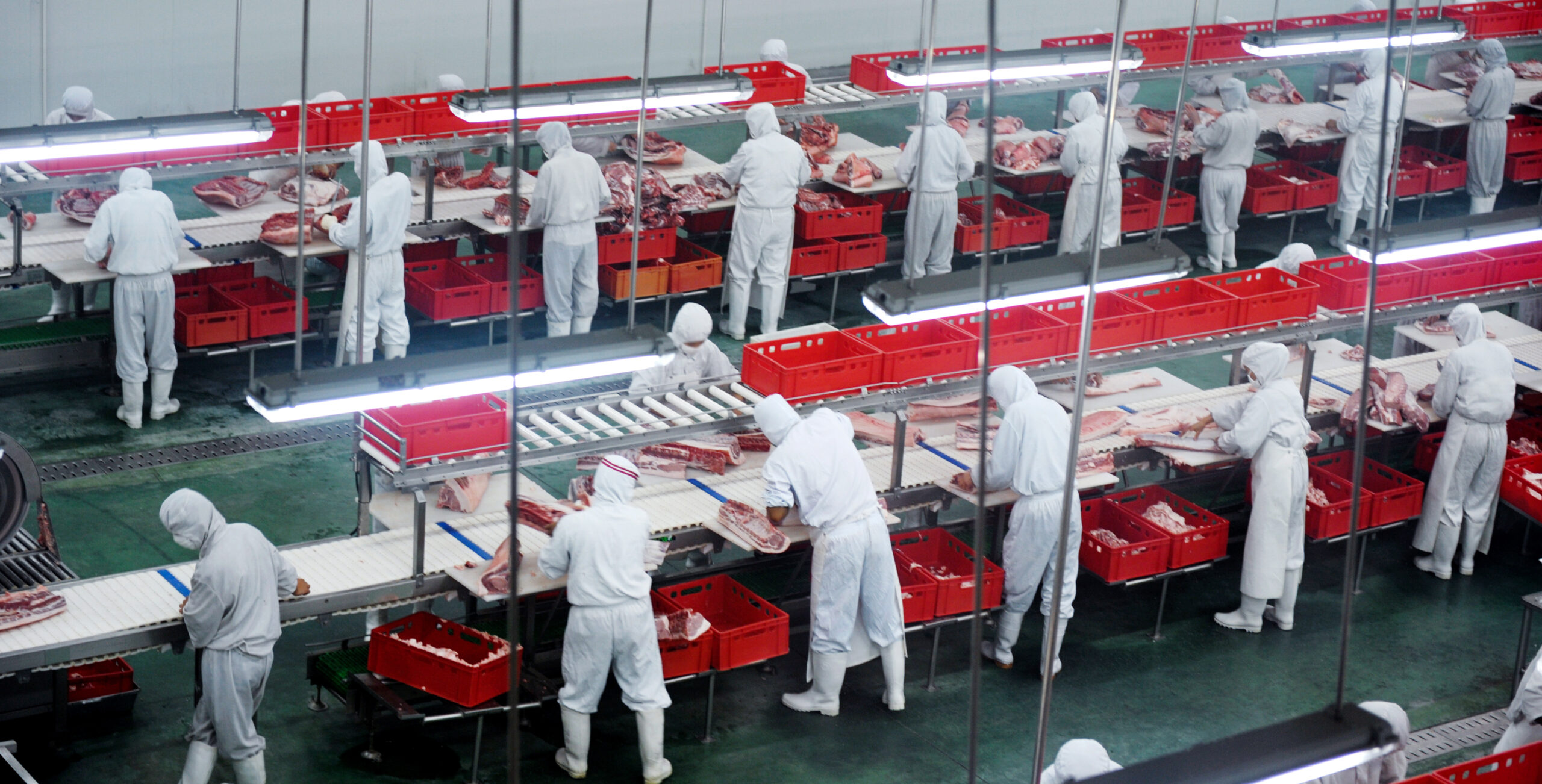
Group of workers in a pork industry plant. Photo by hxdbzxy on iStock by Getty Images

Share
The union representing meatpacking workers employed by Tony Downs Foods in Madelia, Minn., has a new and historic proposal in response to the plant’s employment of teenagers aged 14 to 17 in illegal and hazardous positions.
United Food and Commercial Workers (UFCW) Local 663, which represents over 5,000 essential meatpackers across Minnesota including workers at Tony Downs Foods, is demanding the establishment of a child wellbeing fund. The employer would contribute 10 cents per each regular hour worked up to $50,000 to go toward alleviating working conditions that violate child labor laws, like the long hours that children have been found working into the night, and providing opportunities that would benefit the community, like summer internships.
Rena Wong, president of UFCW Local 663, says that the union is hoping this demand is the beginning of establishing a standard for child wellbeing funds across Minnesota and the United States. “We can’t let this continue,” Wong says of the illegal practices. “We have to be leaders and create solutions so that our kids feel safe that they are loved and that they’re taken care of and can just be children.”
The union says they are not aware of any other labor contract proposals like this seeking to address and prevent child labor violations, although violations have been increasing across the United States. Reporting in The New York Times on migrant child labor spurred initiatives and investigations from government agencies tasked with enforcement. Photos of children in Minnesota working in hazardous positions for meatpacking companies and news of children dying in the roofing and poultry industries are just some of the stories making headlines as lawmakers have attempted rollbacks of child labor protections in state legislatures.
“These children should not be working, they should be going to school,” said Marbel Bruno, who has worked at Tony Downs Foods for 16 years, in a press release. “I wouldn’t want my children at that age working. They overcame so many fears to come here and become something. Studying is what is going to give them a better life.”
In 2023, an investigation by the Minnesota Department of Labor and Industry found that Tony Downs Foods violated child labor laws. Tony Downs Foods has denied they violated the law, but agreed to pay a $300,000 fine and to a three-year compliance period. An investigation by the U.S. Department of Labor found that Wisconsin-based Packers Sanitation Services Inc., used child labor across 13 plants, three of which are in Minnesota, including the unionized JBS plant in Worthington, Minn. Another federal investigation in 2023 also found that Tennessee-based Monogram Foods violated child labor laws at a plant in Chandler, Minn.
“The stakes are really too high to keep driving children to these false choices with potentially life-threatening consequences of being hurt and being killed at work,” said Jessica Lee Velasco, southern Minnesota coalition director at Unidos MN, at a press conference with the union announcing the proposal. “If we don’t take care of the generation now, what are we expecting for years to come?”
Unidos MN first began working with UFCW Local 663 while forming the Driver’s Licenses for All coalition in 2019. Their bases both consist of immigrant workers in meatpacking communities in Greater Minnesota.
According to the Occupational Safety and Health Administration, hazards for workers in meatpacking plants include high noise levels, dangerous equipment, slippery floors, musculoskeletal disorders, and hazardous chemicals.
The last injury that Edgar, who only used his first name, suffered at the Hylife pork processing plant in Windom, Minn. which closed last year, made him unable to work without pain. “I can’t even carry my kids again without it causing pain in my back,” says Edgar, a leader with Unidos MN who spoke during a press conference. “Meat processing plants are not safe places for our children and adolescents, not only because of the risks that this entails, but also because it interrupts healthy physical, psychological development and health in general.”
In the early 1900s and before, children were regularly working in meatpacking plants to support their families. The workers that first organized a union at Hormel in Austin, Minn., the IWW-influenced Independent Union of All Workers, once stopped work on the killing floor over being forced to contribute part of their paychecks to a community chest on which the workers themselves depended.
“Is it enough to restore all the harm? No,” Wong says of the bargaining proposal. “But is it a start? Yes, it is a start to a solution and that is who and what we want to be as Minnesotans, creating everyday solutions to protect children, to protect workers, and make sure that they don’t have to be in this false choice of going to work or going to school and trying to live this American dream in Minnesota.”

